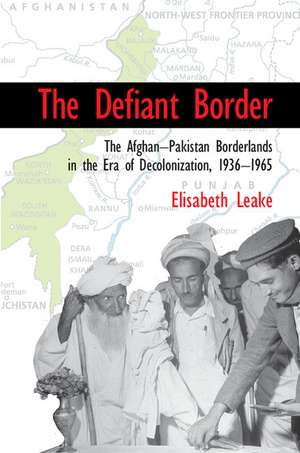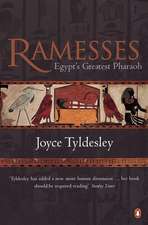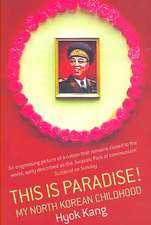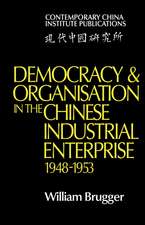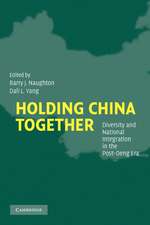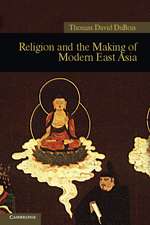The Defiant Border: The Afghan-Pakistan Borderlands in the Era of Decolonization, 1936–1965: Cambridge Studies in US Foreign Relations
Autor Elisabeth Leakeen Limba Engleză Paperback – 21 dec 2016
| Toate formatele și edițiile | Preț | Express |
|---|---|---|
| Paperback (1) | 236.02 lei 6-8 săpt. | |
| Cambridge University Press – 21 dec 2016 | 236.02 lei 6-8 săpt. | |
| Hardback (1) | 609.79 lei 6-8 săpt. | |
| Cambridge University Press – 23 dec 2016 | 609.79 lei 6-8 săpt. |
Din seria Cambridge Studies in US Foreign Relations
-
 Preț: 226.35 lei
Preț: 226.35 lei - 11%
 Preț: 694.04 lei
Preț: 694.04 lei -
 Preț: 208.30 lei
Preț: 208.30 lei -
 Preț: 289.78 lei
Preț: 289.78 lei -
 Preț: 289.85 lei
Preț: 289.85 lei -
 Preț: 230.51 lei
Preț: 230.51 lei -
 Preț: 189.86 lei
Preț: 189.86 lei -
 Preț: 372.00 lei
Preț: 372.00 lei -
 Preț: 374.10 lei
Preț: 374.10 lei -
 Preț: 287.07 lei
Preț: 287.07 lei -
 Preț: 271.77 lei
Preț: 271.77 lei - 11%
 Preț: 536.64 lei
Preț: 536.64 lei -
 Preț: 325.16 lei
Preț: 325.16 lei -
 Preț: 227.49 lei
Preț: 227.49 lei -
 Preț: 289.95 lei
Preț: 289.95 lei -
 Preț: 226.17 lei
Preț: 226.17 lei -
 Preț: 181.93 lei
Preț: 181.93 lei -
 Preț: 321.90 lei
Preț: 321.90 lei -
 Preț: 179.53 lei
Preț: 179.53 lei -
 Preț: 211.94 lei
Preț: 211.94 lei -
 Preț: 413.07 lei
Preț: 413.07 lei -
 Preț: 406.71 lei
Preț: 406.71 lei -
 Preț: 405.35 lei
Preț: 405.35 lei -
 Preț: 179.34 lei
Preț: 179.34 lei
Preț: 236.02 lei
Nou
Puncte Express: 354
Preț estimativ în valută:
45.16€ • 47.06$ • 37.39£
45.16€ • 47.06$ • 37.39£
Carte tipărită la comandă
Livrare economică 03-17 aprilie
Preluare comenzi: 021 569.72.76
Specificații
ISBN-13: 9781107571563
ISBN-10: 1107571561
Pagini: 272
Ilustrații: 4 maps
Dimensiuni: 152 x 230 x 15 mm
Greutate: 0.39 kg
Editura: Cambridge University Press
Colecția Cambridge University Press
Seria Cambridge Studies in US Foreign Relations
Locul publicării:New York, United States
ISBN-10: 1107571561
Pagini: 272
Ilustrații: 4 maps
Dimensiuni: 152 x 230 x 15 mm
Greutate: 0.39 kg
Editura: Cambridge University Press
Colecția Cambridge University Press
Seria Cambridge Studies in US Foreign Relations
Locul publicării:New York, United States
Cuprins
Introduction. 'A doughty and honorable opponent': historicizing the Afghan-Pakistan borderlands; 1. The Pashtun tribes; 2. Geopolitics and state-building; 3. Book structure; Part I. 'Using a Crowbar to Swat Wasps': The Frontier Tribal Area in Imperial Defense: 4. India in interwar British imperial strategy; 5. Indian nationalism, the Indian army, and regional relations; 6. The 1936–7 revolt and its aftermath; 7. Indian nationalists, the subcontinent's defense, and the war effort; 8. The Pashtuns and the war effort; 9. Conclusion; Part II. The 'Opening of Sluice Gates': Plan Partition and the Frontier: 10. The end of war, imperial decline, and plan partition; 11. Reconciling independent South Asia and imperial defense; 12. The NWFP and the 1945–6 elections; 13. British policy towards the frontier tribal area; 14. Nehru's visit to the frontier and the local decline of the congress; 15. Afghanistan, regional relations, and India's Pashtuns; 16. The NWFP referendum and the future of the tribal zone; 17. Independence and evolving tribal identity; 18. Pakistan and the frontier tribal area; 19. Conclusion; Part III. 'We are One People and Ours is a Land': The Demand for Pashtunistan, 1948–52: 20. Britain, the emerging Cold War, and the Kashmir conflict; 21. Kashmir in Indio-Pakistan relations; 22. The development of independent Pakistan; 23. The rise of Afghan-Pakistan tensions; 24. Pakistan and the frontier tribal area; 25. Pashtunistan in regional and international relations; 26. Conclusion; Part IV. A 'Friendly Point of Return': Pakistan and the Global Cold War: 27. The emergence of the United States-Pakistan alliance; 28. The impasse in Afghan-Pakistan relations; 29. The frontier tribal area and the one unit plan; 30. Renegotiating Afghan-Pakistan relations in the Cold War; 31. Conclusion; Part V. An 'Eye for an Eye': Mohammad Ayub Khan and the Collapse of Regional Relations: 32. India and the United States: democracies reunited; 33. Ayub Khan's ascendancy; 34. Domestic change and integrating borderlands; 35. Daud and Afghan modernization; 36. Violence returns to the borderlands; 37. The 1960 Afghan-Pakistan rupture; 38. The failure of US mediation; 39. The aftermath of the encounter; 40. Conclusion; Part VI. Conclusion. 'Religion, Land, Lineage, and Honour': The Afghan-Pakistan Borderlands Then and Now: 41. Pashtunistan then and now.
Recenzii
'Elisabeth Leake explains why a small and peripheral part of the world, the Federally Administered Tribal Areas of the frontier region between Pakistan and Afghanistan, should have had for much of the twentieth century an influence out of all proportion to their size on the politics both of surrounding states and of the great powers. This book is essential reading for those interested in the geopolitics of South Asia in the twentieth and twenty-first centuries.' Francis Robinson, Royal Holloway, University of London
'By putting the politics of imperialism and the Cold War at the heart of the study of the Afghanistan-Pakistan frontier region, this book makes a novel theoretical and empirical contribution to the study of this troubled part of the world. Scholars, students, and policy-makers alike should all read Leake's thought-provoking and carefully researched study.' Magnus Marsden, Director of Sussex Asia Centre, University of Sussex
'In The Defiant Border, Elisabeth Leake tells the important and neglected story of South Asia's other great rivalry: the contested border between Afghanistan and Pakistan. Bridging the colonial and post-colonial eras, this book depicts the stubborn endurance of imperial borders, the power of local actors, and the challenges these posed to great powers. Based on impressive research across three continents, carefully argued, and cogently written, this is a major contribution to the study of South Asia in the world.' Robert B. Rakove, Stanford University, California
'… Leake's The Defiant Border sets out a new, comprehensive, and compelling intellectual roadmap with which to navigate the complex historical terrain that has shaped the Afghan-Pakistan borderlands over the course of the last century.' Paul M. McGarr, H-Diplo
'In tracing the appeal of the borderlands for various powers, Leake, through gaps in the archives, weaves an intricate historical description that resists any homogeneous linear narrativization of Pashtun as an identity and Pashtunistan as a movement and the complex entanglement of the latter with Kashmir. These contributions are particularly relevant for the current political moment unfolding in Pakistan named the Pashtun Tahafuz Movement (PTM) - a movement to demand an end to the violence inflicted on the lives of those in the Pashtun borderlands … Leake's book is widely appealing.' Zunaira Komal, H-Net Reviews (H-Net.org/reviews)
'By putting the politics of imperialism and the Cold War at the heart of the study of the Afghanistan-Pakistan frontier region, this book makes a novel theoretical and empirical contribution to the study of this troubled part of the world. Scholars, students, and policy-makers alike should all read Leake's thought-provoking and carefully researched study.' Magnus Marsden, Director of Sussex Asia Centre, University of Sussex
'In The Defiant Border, Elisabeth Leake tells the important and neglected story of South Asia's other great rivalry: the contested border between Afghanistan and Pakistan. Bridging the colonial and post-colonial eras, this book depicts the stubborn endurance of imperial borders, the power of local actors, and the challenges these posed to great powers. Based on impressive research across three continents, carefully argued, and cogently written, this is a major contribution to the study of South Asia in the world.' Robert B. Rakove, Stanford University, California
'… Leake's The Defiant Border sets out a new, comprehensive, and compelling intellectual roadmap with which to navigate the complex historical terrain that has shaped the Afghan-Pakistan borderlands over the course of the last century.' Paul M. McGarr, H-Diplo
'In tracing the appeal of the borderlands for various powers, Leake, through gaps in the archives, weaves an intricate historical description that resists any homogeneous linear narrativization of Pashtun as an identity and Pashtunistan as a movement and the complex entanglement of the latter with Kashmir. These contributions are particularly relevant for the current political moment unfolding in Pakistan named the Pashtun Tahafuz Movement (PTM) - a movement to demand an end to the violence inflicted on the lives of those in the Pashtun borderlands … Leake's book is widely appealing.' Zunaira Komal, H-Net Reviews (H-Net.org/reviews)
Notă biografică
Descriere
This book explores why the Afghan-Pakistan borderlands have remained largely independent of state controls throughout the twentieth century.
